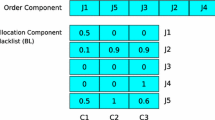Abstract
A key challenge faced by large-scale computing platforms to go green is the effective utilization of energy at the various processing nodes. Most existing scheduling models assume that processors are able to stay online forever. In reality, processors, however, may have arbitrary unavailable time periods. Hence, if we inadvertently assign tasks to processors without considering the availability constraints, some processors would not be able to finish their assigned workloads. Thus all the unfinished workloads need to be reassigned to other available processors resulting in an inefficient time and energy schedule. In this chapter, we propose a novel processor availability-aware divisible-load scheduling model. Using this model, we design a time-efficient genetic algorithm based global optimization technique to derive an optimal load distribution strategy. Our experimental results show that the proposed algorithm adapts to minimize the processing time, hence the energy consumption too, by over 60% compared to other strategies.
Access this chapter
Tax calculation will be finalised at checkout
Purchases are for personal use only
Similar content being viewed by others
References
L. Mashayekhy, M.M. Nejad, D. Grosu, Q. Zhang, W. Shi, Energy-aware scheduling of mapreduce jobs for big data applications. IEEE Trans Parallel Distrib. 26, 2720–2733 (2015)
J. Cao, K. Li, I. Stojmenovic, Optimal power allocation and load distribution for multiple heterogeneous multicore server processors across clouds and data centers. IEEE Trans. Comput. 63, 45–58 (2014)
Y.N. Xia, M.C. Zhou, X. Luo et al., A stochastic approach to analysis of energy-aware DVS-enabled cloud datacenters. IEEE Trans. Syst. Man Cybern. A 45, 73–83 (2015)
X. Zhu, C. He, K. Li et al., Adaptive energy-efficient scheduling for real-time tasks on DVS-enabled heterogeneous clusters. J. Parallel Distrib. Combut. 72, 751–763 (2012)
G. Terzopoulos, H. Karatza, Performance evaluation and energy consumption of a real-time heterogeneous grid system using DVS and DPM. Simul. Model Pract. Theory 36, 33–43 (2013)
P. Zhou, W. Zheng, An efficient biobjective heuristic for scheduling workflows on heterogeneous DVS-enabled processors. J. Appl. Math. 2014 (2014)
B. Luo, S. Wang, W. Shi, Y. He, eCope: workload-aware elastic customization for power efficiency of high-end servers. IEEE Trans. Cloud Comput. 4, 237–249 (2016)
P. Lama, Y. Guo, C. Jiang, X. Zhou, Autonomic performance and power control for co-located web applications in virtualized datacenters. IEEE Trans. Parallel Distrib. 27, 1289–1302 (2016)
Z. Xiao, W. Song, Q. Chen, Dynamic resource allocation using virtual machines for cloud computing environment. IEEE Trans. Parallel Distrib. 24, 1107–1117 (2013)
U. Wajid, P. Plebani, B. Pernici et al., On achieving energy efficiency and reducing CO\(_2\) footprint in cloud computing. IEEE Trans. Cloud Comput. 4, 138–151 (2016)
H. Liu, H. Jin, C.Z. Xu et al., Performance and energy modeling for live migration of virtual machines. Cluster Comput. 16, 249–264 (2013)
A. Corradi, M. Fanelli, L. Foschini, VM consolidation: a real case based on OpenStack Cloud. Future Gener. Comput. Syst. 32, 118–127 (2014)
X. Dai, M. Wang, B. Benasou, On achieving energy efficiency and reducing CO\(_2\) footprint in cloud computing. IEEE Trans. Cloud Comput. 4, 210–221 (2016)
E. Feller, L. Ramakrishnan, C. Morin, Performance and energy efficiency of big data applications in cloud environments: a Hadoop case study. J. Parallel Distrib. Comput. 79, 80–89 (2015)
T.G. Robertazzi, Ten reasons to use divisible load theory. Computer 36, 63–68 (2003)
S. Momcilovic, A. Ilic, N. Roma, L. Sousa, Dynamic load balancing for real-time video encoding on heterogeneous CPU+GPU systems. IEEE Trans. Multimedia 16, 108–121 (2014)
A. Ilic, S. Momcilovic, N. Roma, L. Sousa, Adaptive scheduling framework for real-time video encoding on heterogeneous systems. IEEE Trans. Circ. Syst. Video Technol. 26, 597–611 (2016)
S. Suresh, H. Huang, H.J. Kim, Scheduling in compute cloud with multiple data banks using divisible load paradigm. IEEE Trans. Aerosp. Electron. Syst. 51, 1288–1297 (2015)
Z. Ying, T.G. Robertazzi, Signature searching in a networked collection of files. IEEE Trans. Parallel Distrib. 25, 1339–1348 (2014)
V. Mani, D. Ghose, Distributed computation in linear networks: closed-form solutions. IEEE Trans. Aerosp. Electron. Syst. 30, 471–483 (1994)
T.E. Carroll, D. Grosu, Strategyproof mechanisms for scheduling divisible loads in bus-networked distributed systems. IEEE Trans. Parallel Distrib. 19, 1124–1135 (2008)
S. Ghanbari, M. Othman, M.R.A. Bakar, W.J. Leong, Multi-objective method for divisible load scheduling in multi-level tree network. Future Gener. Comput. Syst. 54, 132–143 (2016)
Z. Zhang, T.G. Robertazzi, Scheduling divisible loads in Gaussian, mesh and torus network of processors. IEEE Trans. Comput. 64, 3249–3264 (2015)
C.Y. Chen, C.P. Chu, Novel methods for divisible load distribution with start-up costs on a complete b-Ary tree. IEEE Trans. Parallel Distrib. 26, 2836–2848 (2015)
K. Wang, T.G. Robertazzi, Scheduling divisible loads with nonlinear communication time. IEEE Trans. Aerosp. Electron. Syst. 51, 2479–2485 (2015)
V. Bharadwaj, D. Ghose, V. Mani, Optimal sequencing and arrangement in distributed single-level tree networks with communication delays. IEEE Trans. Parallel Distrib. 5, 968–976 (1994)
H.J. Kim, G.I. Jee, J.G. Lee, Optimal load distribution for tree network processors. IEEE Trans. Aerosp. Electron. Syst. 32, 607–612 (1996)
B. Veeravalli, X. Li, C.C. Ko, On the influence of start-up costs in scheduling divisible loads on bus networks. IEEE Trans. Parallel Distrib. 11, 1288–1305 (2000)
S. Mingsheng, Optimal algorithm for scheduling large divisible workload on heterogeneous system. Appl. Math. Model. 32, 1682–1695 (2008)
V. Bharadwaj, G. Barlas, Scheduling divisible loads with processor release times and finite size buffer capacity constraints in bus networks. Cluster Comput. 6, 63–74 (2003)
M. Gallet, Y. Robert, F. Vivien, Comments on “design and performance evaluation of load distribution strategies for multiple loads on heterogeneous linear daisy chain networks”. J. Parallel Distrib. Comput. 68, 1021–1031 (2008)
M. Hu, B. Veeravalli, Requirement-aware strategies with arbitrary processor release times for scheduling multiple divisible loads. IEEE Trans. Parallel Distrib. 22, 1697–1704 (2011)
S. Suresh, V. Mani, S.N. Omkar, H.J. Kim, A real coded genetic algorithm for data partitioning and scheduling in networks with arbitrary processor release time, in Asia-Pacific Computer Systems Architecture Conference (2005), pp. 529–539
K. Choi, T.G. Robertazzi, An exhaustive approach to release time aware divisible load scheduling. Int. J. Internet Distrib. Comput. Syst. 1, 40–50 (2011)
H.J. Kim, A novel optimal load distribution algorithm for divisible loads. Cluster Comput. 6, 41–46 (2003)
D.C. Snowdon, S.M. Petters, G. Heiser, Accurate on-line prediction of processor and memory energy usage under voltage scaling, in 7th ACM and IEEE International Conference on Embedded Software (2007), pp. 84–93
K. Li, X. Tang, K. Li, Energy-efficient stochastic task scheduling on heterogeneous computing systems. IEEE Trans. Parall. Distrib. 25, 2867–2876 (2014)
D.M. Bui, H.Q. Nguyen, Y. Yoon, S. Jun, M.B. Amin, S. Lee, Gaussian process for predicting CPU utilization and its application to energy efficiency. Appl. Intell. 43, 874–891 (2015)
J.H. Holland, Adaptation in natural and artificial systems: an introductory analysis with applications to biology, control, and artificial intelligence. U. Michigan Press. (1975)
L. Hernando, A. Mendiburu, J.A. Lozano, A tunable generator of instances of permutation-based combinatorial optimization problems. IEEE T. Evolut. Comput. 20, 165–179 (2016)
B.W. Goldman, W.F. Punch, Analysis of Cartesian genetic programming’s evolutionary mechanisms. IEEE Trans. Evolut. Comput. 19, 359–373 (2015)
Acknowledgements
This is a collaborative research work conducted jointly between Department of Electrical and Computer Engineering, National University of Singapore, Singapore, and School of Computer Science and Technology, Xidian University, China and supported by National Natural Science Foundation of China (No. 61402350, No. 6 1472297, and No. 61572391), the Fundamental Research Funds for the Central Universities (No. JB150307) and China Scholarship Council.
Author information
Authors and Affiliations
Corresponding author
Editor information
Editors and Affiliations
Rights and permissions
Copyright information
© 2017 Springer International Publishing AG
About this chapter
Cite this chapter
Wang, X., Veeravalli, B. (2017). A Genetic Algorithm Based Efficient Static Load Distribution Strategy for Handling Large-Scale Workloads on Sustainable Computing Systems. In: Sangaiah, A., Abraham, A., Siarry, P., Sheng, M. (eds) Intelligent Decision Support Systems for Sustainable Computing. Studies in Computational Intelligence, vol 705. Springer, Cham. https://doi.org/10.1007/978-3-319-53153-3_2
Download citation
DOI: https://doi.org/10.1007/978-3-319-53153-3_2
Published:
Publisher Name: Springer, Cham
Print ISBN: 978-3-319-53152-6
Online ISBN: 978-3-319-53153-3
eBook Packages: EngineeringEngineering (R0)




